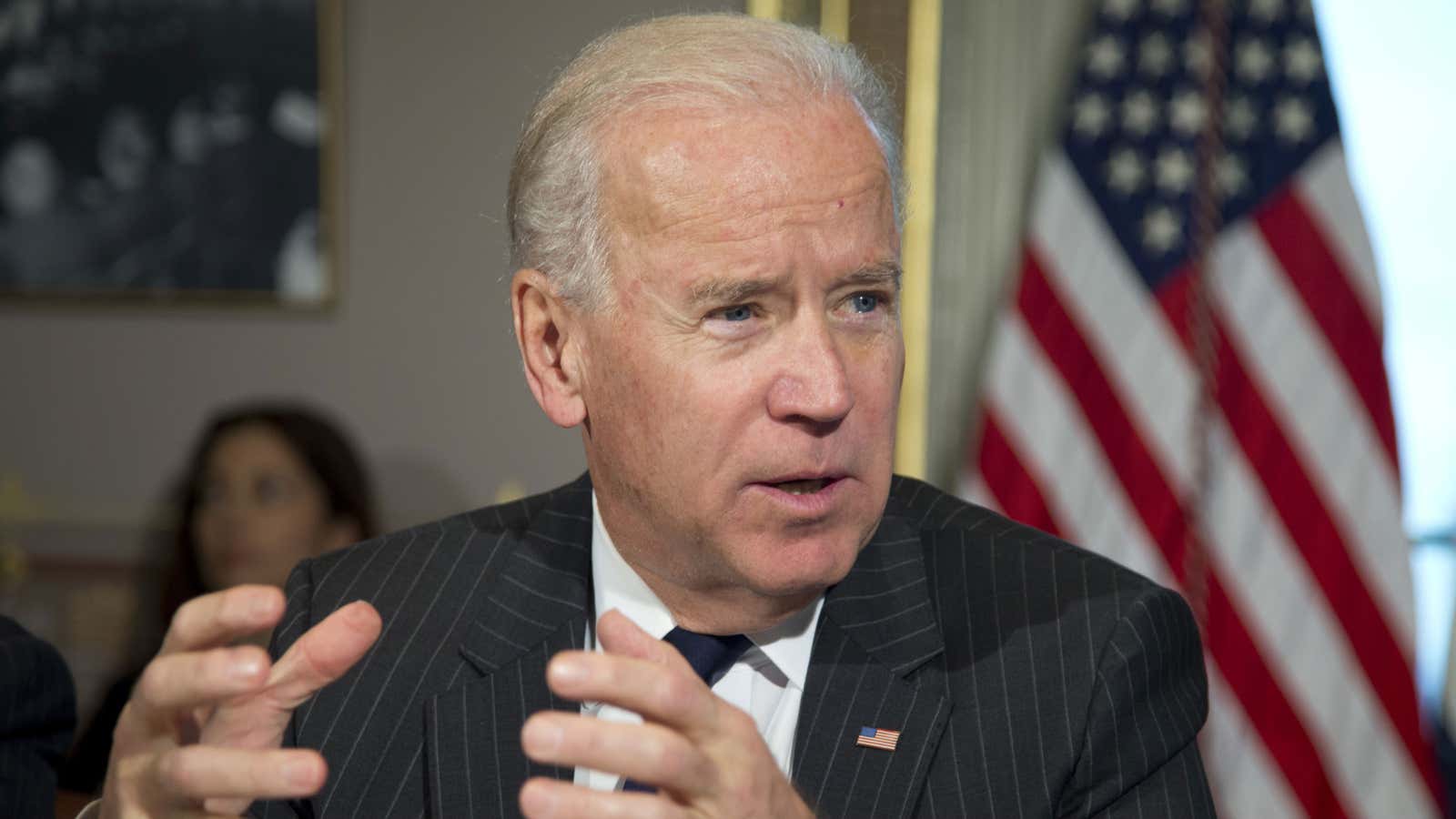Update (5.30pm ET): Though Vice President Joe Biden and Senate Minority Leader Mitch McConnell are said to have reached a deal, the Majority Leader, the Democrats’ Harry Reid, hasn’t signed off on it yet, reportedly. Business Insider’s Joe Weisenthal quips: “As a member of the MSM [mainstream media], I’m already figuring out how to blame House GOP if Reid ends up being the stumbling block.”
Update (5.10pm): Here’s where we seem to be:
- A deal has (most likely) been reached. The Guardian has the details.
- The Senate could vote on it tonight, but the House won’t vote until at least tomorrow.
- Therefore, the US is going over the fiscal cliff.
- But it won’t matter—at least not immediately—because the agreement will be made retroactive.
- However, lots of problems have merely been postponed, so expect more of this kind of brinkmanship in the coming weeks.
Update (2.27pm): Much commentary on Twitter and elsewhere to the effect that the president’s barbed public remarks about Republican obstructionism may have just made a deal harder to achieve. Some even seem to think it was deliberate, since he has a certain incentive to let the country go over the cliff. (Doing so would lead to across-the-board tax hikes, and the Republicans would likely get most of the blame, even if tax rates were negotiated back down again quickly afterward.)
Meanwhile, here’s the latest version of what that deal is shaping up to be, from the Huffington Post.
Update (1.04pm): The Dow and Nasdaq have both spiked briefly on rumors that a deal is in the works, though have started heading downwards again. President Obama is due to speak at 1.30pm.
Update (12.16pm): The Financial Times has a useful summary (paywall) of the possible scenarios for today. A summary of the summary:
- No deal at all. America goes over the cliff. (Here’s what the first month of that looks like.)
- Limited deal today or soon after today. These look the most likely right now (see the update at 11.40, below). The worst immediate impacts are avoided, but new compromises need to be worked out in the coming months—i.e., more of the same.
- Full deal. Not a chance.
And of course, no matter what happens, they’ll have to renegotiate the debt ceiling again in a few weeks.
Update (11.40am): Encouraging noises are coming from the Senate, where Democratic Majority Leader Harry Reid says negotiators could reach a deal tonight. The outlines, reports ABC News, are:
- A $450,000 threshold for income-tax hikes
- Keeping the current estate tax (35%, on estates over $5 million)
- No alternative minimum tax for the middle-class
- Extend unemployment benefits
- Avert the 27% cut on Medicare payments to doctors
- Delay “sequestration” (i.e., spending cuts) for three months
However, there are some unhappy people speaking on the Senate floor right now, complaining about being shut out of the negotiating process. And if a bill is agreed in the Democrat-dominated Senate, it still has to be approved by the Republican-dominated House of Representatives. So the US is likely to go over the cliff at least temporarily—though if a deal is reached today and not voted on until after Jan. 1, it can be made retroactive to prevent the cliff’s impacts kicking in.
Original (9.06am ET)
With the midnight Dec. 31 deadline for the US fiscal cliff fast approaching, Democrat and Republican lawmakers have yet to reach a deal that would stave off the tax hikes and dramatic spending cuts due to go into effect.
The Washington Post reports that Democrats have softened their stances on taxes, agreeing to tax hikes on family earnings over $450,000 rather than President Barack Obama’s campaign trail proposal of a $250,000 level. Democrats have also committed to keeping estate taxes at their current low levels. Republicans are still pushing for the income tax hikes to kick in at $550,000 per family, and are unhappy with the Democrats’ proposal of higher taxes on investment profits for households earning over $250,000.
Politico reports that Vice President Joe Biden and Republican Senate Minority Leader Mitch McConnell made major progress overnight on a deal, with Biden having stepped in for the Democrats after Senate Majority Leader Harry Reid’s discussions with McConnell failed to reach a breakthrough.
In the absence of a bipartisan deal, Reid plans to bring to the Senate today a backup proposal that tackles a subset of the issues at stake, including keeping tax rates at their current levels for family incomes up to $250,000.
If the outlines of a bipartisan deal are reached, it will be first brought to a vote in the Senate. If it passes there, the House of Representatives would then quickly take it up for a vote.
Quartz will provide updates throughout the day. You can find all of our coverage of the fiscal cliff here, and a visual look at the state of play at hastheusgoneoffthefiscalcliff.com
You can also find a list of what will actually happen if the US does go over the fiscal cliff here.
